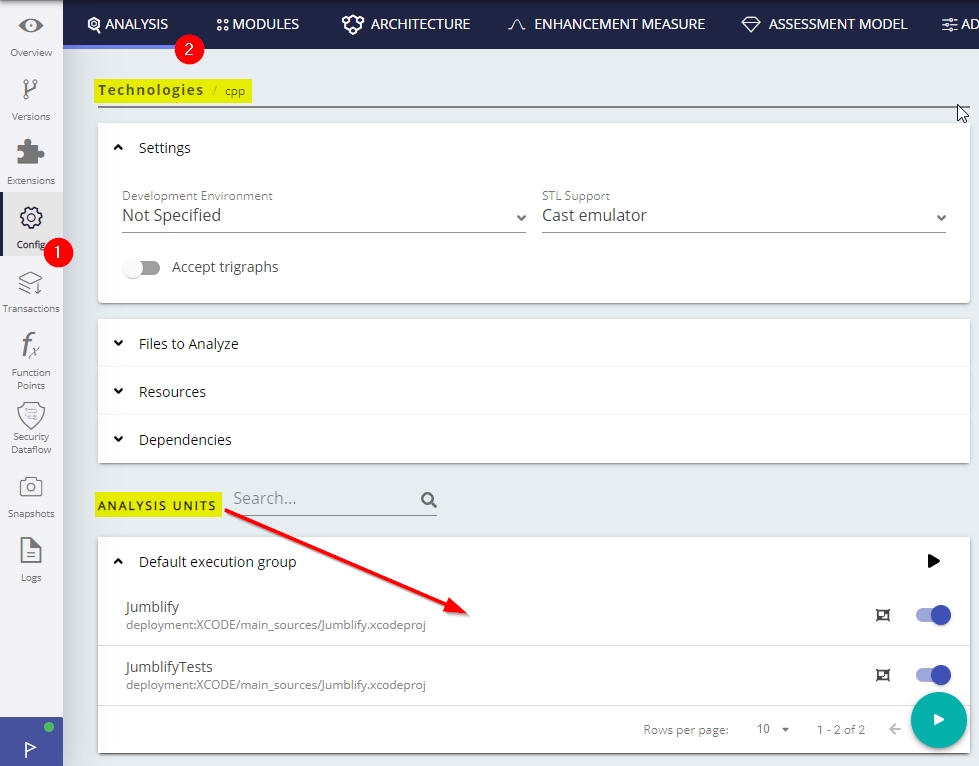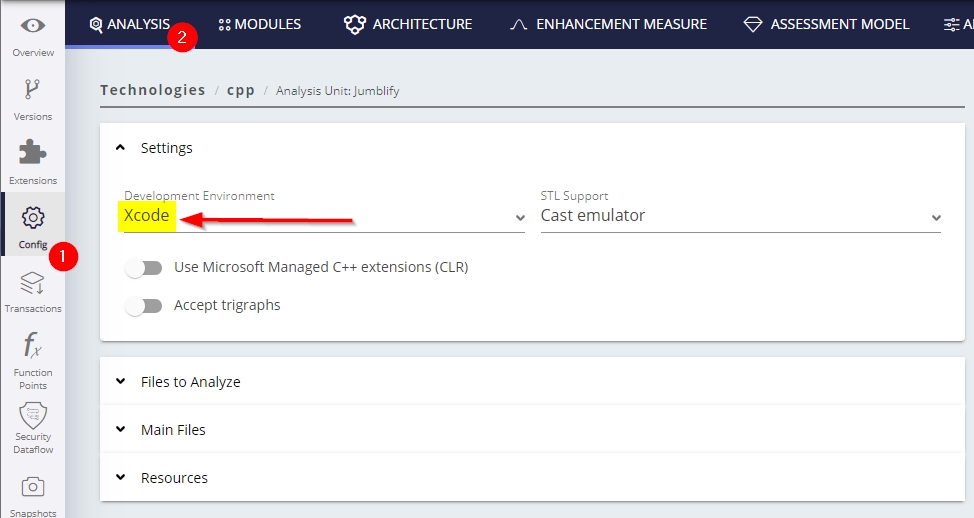iOS - Swift - 1.2
Extension ID
com.castsoftware.swift
What’s new?
See iOS - Swift 1.2 - Release Notes.
Description
This extension provides support for iOS mobile applications written in Swift built with Xcode.
In what situation should you install this extension?
If you have an iOS mobile application written in Swift and built with Xcode and you want to view the source code object types and their links with other objects, then you should install this extension.
How CAST detects XCode projects
The Swift extension is dependent on the com.castsoftware.cfamily, which includes a discoverer that enables Xcode projects to be detected (see com.castsoftware.dmtxcodediscoverer). CAST will search for the project.pbxproj (or a .pbxproj file) - when one is found, the contents are inspected and are used to determine the list of projects present in the root folder.
What are the differences with the extension for iOS Objective-C?
The com.castsoftware.cfamily extension is aimed at analyzing iOS mobile applications written in Objective-C (and to a lesser extent C and C++) and built with XCode. The Swift extension can do the same thing, however, it also supports source code written using the Swift technology.
Supported Languages
The following languages used to write iOS mobile applications are supported by this extension:
| Technology | Supported | Notes |
|---|---|---|
| Objective-C | Supported via the dependent com.castsoftware.cfamily extension. | |
| C/C++ | Supported via the dependent com.castsoftware.cfamily extension. | |
| Swift | - |
Technology support
| Version | Supported |
|---|---|
| Swift 3.2 - 5.2 |
Supported iOS and third-party frameworks
Please see the same section in the com.castsoftware.cfamily for more information.
Function Point, Quality and Sizing support
| Function Points (transactions) |
A green tick indicates that OMG Function Point counting and Transaction Risk Index are supported. | |
|---|---|---|
| Quality and Sizing | A green tick indicates that CAST can measure size and that a minimum set of Quality Rules exist. |
CAST Imaging Core compatibility
| Release | Operating System | Supported |
|---|---|---|
| 8.3.x | Microsoft Windows |
Dependencies with other extensions
Some CAST extensions require the presence of other CAST extensions in order to function correctly. The Swift extension requires that the following other CAST extensions are also installed:
Download and installation instructions
The extension will be automatically installed by CAST Imaging Console.
Source code discovery
.swift files
A discoverer is provided with the extension to automatically detect Swift specific code: a Universal Technology project will be discovered for the package’s root folder when at least one .swift file is detected in the root folder or any sub-folders. For every project located, one Universal Technology Analysis Unit will be created:
Xcode (.pbxproj files)
A discoverer (see com.castsoftware.dmtxcodediscoverer) is provided with the extension to automatically detect Xcode code: CAST will search for the project.pbxproj (or a .pbxproj file) - when one is found, the contents are inspected and are used to determine the list of projects present in the root folder. For every Xcode project located, one C/C++ Technology Analysis Unit will be created:

Analysis configuration
For each C/C++ Technology Analysis Unit created for an Xcode project discovered by CAST, the following options should be set as shown below:

Automatic exclusion of test and external dependency files from analysis
Analyzers are aimed at the study of the application source code. References and calls to external libraries are conveniently left out of the analysis, except for those that can be interpreted as elements taking part in a transaction, such as web service requests or database queries.
The Swift analyzer will skip files found inside the two standard locations of the two leading dependency managers: \Carthage\Checkouts and Pods. On the other hand, all files found inside a folder (or within sub-folders) with name ending “Tests” are considered as test files (consistent with Xcode conventions). This feature works upon detection of the project ‘.xcodeproj\ folder to assure the files belong to a Swift project. However, files with name ending as ‘Tests.swift’ are automatically skipped.
What results can you expect?
Objects
Swift
| Icon | Description |
|---|---|
|
Swift Class |
|
Swift DefaultUnit |
|
Swift Enumeration |
|
Swift Function |
|
Swift Method |
|
Swift Protocol |
|
Swift SourceCode |
|
Swift Structure |
|
Swift DELETE http service |
|
Swift GET http service |
|
Swift POST http service |
|
Swift PUT http service |
Tip: If your application is supposed to be communicating with services, ensure you have GET, POST, PUT, DELETE Service objects created after the analysis.
C/C++
See the same section in the documentation for com.castsoftware.cfamily.
iOS & Objective-C
See the same section in the documentation for com.castsoftware.cfamily.
Structural Rules
The following structural rules are provided:
You can also find a global list here: https://technologies.castsoftware.com/rules?sec=t_1055000&ref=||
Technical information
Web Services
Web service queries are supported for URLSession and the third-party library Alamofire. The same web service objects are used for both of them. For the former, as an example, the code of the form as below will create a Swift Delete http service object with url “http://localhost:8001/rest/todos/{}”:
func deleteTodo(str: String) {
var urlString = "http://localhost:8001/rest/todos/" + str;
guard let url = URL(string: urlString) else { return }
var deleteTask = URLRequest(url: (url as URL?)!, ...)
deleteTask.httpMethod = "DELETE"
URLSession.shared.dataTask(with: deleteTask) {(data, response, error) in
if let jsonData = try? JSONSerialization.jsonObject(with: data!, options: []) {
…
}.resume()
}
For Alamofire we support the request function. In the following example the web service call is represented by a Swift Get http service object
func getTodo(...) {
guard let url = URL(string: "http://localhost:8001/rest/todos/") else {return}
Alamofire.request(url, method: .get, ...)
...
}
}
The (call) links from Swift objects (functions, methods, …) to Swift Web Service objects will be created by the analyzer as well. Similar to other analyzers, the responsible of further linking Services and Operations (possible inter-technology) is the dependency extension com.castsoftware.wbslinker. A picture of a simple call-graph including StoryBoard objects as entry points and Web Services as end points is shown in the following section.
Transactions for Function Points
In the example below we illustrate the results one can expect concerning transactions. The call graph starts from the StoryBoard widgets (eg Button and TextField) which are by default set as entry points. The StoryBoard defining these widgets is interpreted by the com.castsoftware.cfamily extension. After this; the Swift extension will then generate the links between these widgets and Swift objects, such as functions and methods. Eventually the call graph might reach different end points contributing to function point counting. In this example most of the StoryBoard widgets finish calling web services (these could potentially call web service operations inside the very same application so that the transaction would continue):

Known Limitations
-
Some limitations come from the iOS / Objective-C extension, please refer to the com.castsoftware.cfamily documentation.
-
Violations localized in Class Property Initializer objects are not visible in the Dashboard (to be included in forthcoming releases).
-
Operator overloading and definition of custom operators is supported (at parsing level) but use of uncommon symbols may raise errors during the analysis.
-
Duplication of objects is avoided when preprocessing directives (#if, #endif) are used to specialize class, structure, prototype and Enum objects according to used frameworks. In the example below, a single Swift Structure object is generated, specifically, the first one appearing in the code:
#if os(iOS) || os(tvOS)
import UIKit
public struct TextInput<Base: UITextInput> {
}
#endif
#if os(macOS)
import Cocoa
public struct TextInput<Base: NSTextInputClient> {
}
#endif